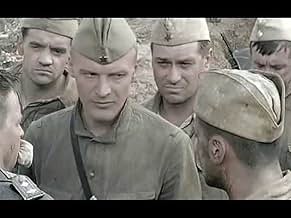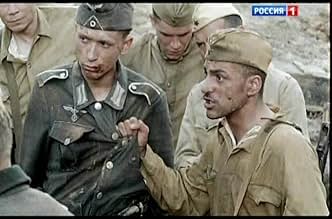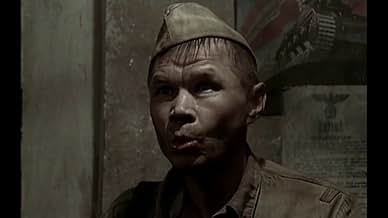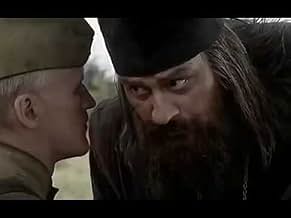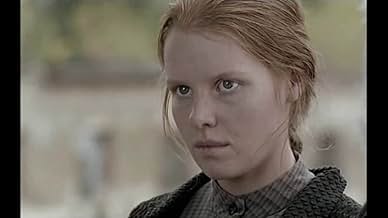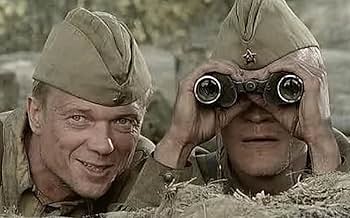Shtrafbat
- Série télévisée
- 2004
- 9h 10m
ÉVALUATION IMDb
7,3/10
1,6 k
MA NOTE
Ajouter une intrigue dans votre langueDrama of the penalty parts of political prisoners, who fought on the Soviet fronts.Drama of the penalty parts of political prisoners, who fought on the Soviet fronts.Drama of the penalty parts of political prisoners, who fought on the Soviet fronts.
- Prix
- 2 nominations au total
Parcourir les épisodes
Avis en vedette
"Shtrafbat" (2004), an 11-part TV series, is about Soviet Army battalions made up of many kinds of prisoners, hoping to be "rehabilitated" of their "crimes".
"Shtrafbat" (Punishment or Penal Battalions) were made up of deserters, political prisoners, and former POWs who had returned from German captivity (according to Stalin: allowing ones-self to be captured alive & imprisoned was akin to surrendering, & surrendering was considered to be treason, a crime punishable by death), and even "regular" criminals sent from prison-camps, so the suspicion that these people wouldn't fight well, or might even surrender, was high. These "criminals" were "graciously" allowed "a second chance" by the government, a chance to "wash away their past sins with their own blood."
These "Shtrafbat" were sent on the most dangerous and difficult missions (i.e. those with low survivability) and were followed into battle by troops who were called "Zagrad-Otryad" (Blocking Troops), and were under NKVD (precursor to the KGB) control. Sometimes these troops were almost as large as the actually fighting units they blocked. They were under orders to shoot any Soviet soldiers who were thought to be retreating, be they wounded or not.
The few "Shtrafbat" soldiers who lived through it for some months, were considered rehabilitated and returned to regular army units. The KIAs were rehabilitated posthumously, sparing their families from being branded as families of traitors, "enemies of the Soviet people."
"Shtrafbat" (Punishment or Penal Battalions) were made up of deserters, political prisoners, and former POWs who had returned from German captivity (according to Stalin: allowing ones-self to be captured alive & imprisoned was akin to surrendering, & surrendering was considered to be treason, a crime punishable by death), and even "regular" criminals sent from prison-camps, so the suspicion that these people wouldn't fight well, or might even surrender, was high. These "criminals" were "graciously" allowed "a second chance" by the government, a chance to "wash away their past sins with their own blood."
These "Shtrafbat" were sent on the most dangerous and difficult missions (i.e. those with low survivability) and were followed into battle by troops who were called "Zagrad-Otryad" (Blocking Troops), and were under NKVD (precursor to the KGB) control. Sometimes these troops were almost as large as the actually fighting units they blocked. They were under orders to shoot any Soviet soldiers who were thought to be retreating, be they wounded or not.
The few "Shtrafbat" soldiers who lived through it for some months, were considered rehabilitated and returned to regular army units. The KIAs were rehabilitated posthumously, sparing their families from being branded as families of traitors, "enemies of the Soviet people."
Many experienced and excellent actors mixed together in an ongoing plot of an untold part of world war II on the eastern front. Characters well portrayed and unforgettable. One episode leaves you wishing for the next. Pay attention to the closing credits were the thousands of Shtrafbat battalions are listed. An untold story involving hundreds of thousands of individuals. Sometimes brutal, sometimes romantic, always filled with real people and dialog. Produced with excellent sets and camera work. Heroes and villains, criminals and priests, patriots and traitors. Portrait of people struggling to survive and overcome a most terrible time. I wish to buy a copy for my own collection so to be able to enjoy the series repeatedly.
With the war not going well for the Soviet Union, Stalin accepted volunteers from the prisons and used the prisoners as shock troops. This is the story of one such battalion. There are petty crooks, political prisoners, soldiers kicked out of other units, gray-haired veterans of the White Army plus some dangerous criminals.
They are thrown into battle ill-equipped, untrained and face the threat of the NKVD if they show signs of cowardice or failure.
The special effects are rudimentary and many of the minor characters are one-dimensional, but the overall story is very human and riveting.
I have not seen a version with subtitles or dubbing. Viewing the show required liberal use of the pause button and explanations from a native speaker of Russian.
They are thrown into battle ill-equipped, untrained and face the threat of the NKVD if they show signs of cowardice or failure.
The special effects are rudimentary and many of the minor characters are one-dimensional, but the overall story is very human and riveting.
I have not seen a version with subtitles or dubbing. Viewing the show required liberal use of the pause button and explanations from a native speaker of Russian.
Life in the Soviet Union's penal battalions was horrific, and this series does a wonderful job of portraying the ugly reality for many persons who perished during the second world war. It is not for the faint-hearted, and certainly extremely realistic when it comes to the ugliness of patriarchal society, and the vision men had (have) of women, many times as mere sex-objects. Certainly the series explores the basal level of the ugliness of human nature, which makes it that much more believable.
Its only detriment, is a cheap politicised usage of religion, especially for Russian nationalistic purposes (otherwise it would have merited a "9 star" rating). Overlook it, and the production is truly a masterpiece of war drama.
Shtrafbat is the story only Russians could tell about the Second World War. The largest front of the whole conflict has been, ironically, the least appearing subject on the silver screen after the war. While the Western Allies war-effort has been pictured in almost every possible detail and manner, the East has been left out or the job has been left to only some old propaganda movies of little else than historical footage value.
There is no chance that Shtrafbat could compete with Band of Brothers in every detail but neither you want to look at the screen with examining petty visual effects in mind. That the soldiers are Russians is enough big reason to forgive the less eye-captivating battle scenes and you can concentrate on the story that is the most interesting. So much different was the war in the Eastern front, and the nature of the Russian army, that you might wish people to produce more dramatizations from the other fronts, and of armies.
Shtrafbat is no way perfect, but it has some rare specialties that augment the overall rating. It tends to crush myths people have about the Second World War, the true heroes were Russian people and not their leaders who sent them to missions where they could only perish. Another great myth bust is that it presents the enemy, who does not pick up his gun, as an equal human being - an advancement that has been difficult to try in many acclaimed films as well. Shtrafbat shows how the war in the eastern front was a war of survival and how the clash of the -isms grinds people into dust.
There is no chance that Shtrafbat could compete with Band of Brothers in every detail but neither you want to look at the screen with examining petty visual effects in mind. That the soldiers are Russians is enough big reason to forgive the less eye-captivating battle scenes and you can concentrate on the story that is the most interesting. So much different was the war in the Eastern front, and the nature of the Russian army, that you might wish people to produce more dramatizations from the other fronts, and of armies.
Shtrafbat is no way perfect, but it has some rare specialties that augment the overall rating. It tends to crush myths people have about the Second World War, the true heroes were Russian people and not their leaders who sent them to missions where they could only perish. Another great myth bust is that it presents the enemy, who does not pick up his gun, as an equal human being - an advancement that has been difficult to try in many acclaimed films as well. Shtrafbat shows how the war in the eastern front was a war of survival and how the clash of the -isms grinds people into dust.
Le saviez-vous
- ConnexionsReferenced in Comedy Club: Episode #1.13 (2005)
Meilleurs choix
Connectez-vous pour évaluer et surveiller les recommandations personnalisées
Détails
- Durée9 heures 10 minutes
- Couleur
Contribuer à cette page
Suggérer une modification ou ajouter du contenu manquant

